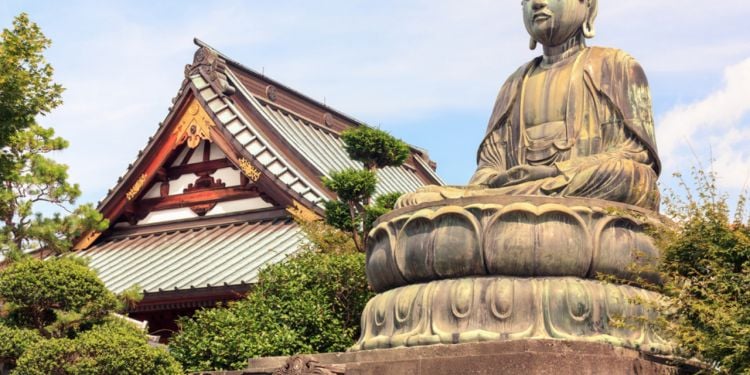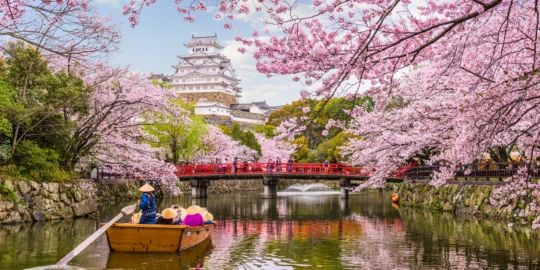Working in Utsunomiya

It is called "the prefecture of monozukiri" ("monozukuri" means "manufacturing"). In Tochigi, industry is at the forefront. Large international companies have set up their headquarters in the prefecture, especially in Utsunomiya, its capital. Are you looking to work in Japan? Would you like to discover Tochigi Prefecture? Let's go to a territory where the Tokugawa's imprint still remains. Rich of its history, the prefecture maintains its heritage, develops a responsible tourism and innovates.
Focus on Tochigi Prefecture
Tochigi Prefecture is located on the main island of Honshu, between Fukushima in the north, Gunma in the west, Saitama in the south and Ibaraki in the east. Tochigi has a population of 1.9 million. The capital of the prefecture is Utsunomiya (the southern half of the prefecture). Utsunomiya is the most populated city of Tochigi, with 518,757 inhabitants.
The other big cities of the prefecture are much less populated than the capital: Oyama, the second biggest city, has 166 666 inhabitants. Oyama is located in the extreme south of the prefecture, not far from the border with Ibaraki prefecture. A little further north, the city of Tochigi with 155,549 inhabitants. Ashikaga is the third biggest city (144,746 inhabitants), in the extreme southwest, near the border with Gunma. The other cities have between 116 000 and 70 000 inhabitants. The famous Nikko has 77 661 inhabitants.
Utsunomiya
The population of the capital city is gradually increasing. It has grown from just over 487,000 in the early 2000s to 518,757 in 2020. The 40-49 age group is the most numerous (79,223 inhabitants), followed by the 50-59 age group (66,416 inhabitants) and the 30-39 age group (61,660 inhabitants). As in many other Japanese prefectures, there are few foreigners in Utsunomiya. The city even lost about 400 of them in 2021. Currently, there are between 9000 and 9500 foreigners (figures: Statistics Bureau of Japan).
History
Tochigi Prefecture
Tochigi's history is marked by the Tokugawa's imprint. In the 12th century, the aristocrats lost power to the shogunate. A dark period of civil wars between the Genji clan and the Heishi clan began. It was not until the 17th century and the reunification of the shogun Ieyasu Tokugawa (1543-1616) that the war stopped. In 1917, the Toshogu shrine was inaugurated in Nikko, a place built in honor of the late shogun.
Utsunomiya
This is the city of ravioli (gyoza), jazz and performing arts. About 50 minutes by train from Tokyo, Utsunomiya is the economic city of the prefecture. It is also one of the top cities to settle in. Its advantages are its infrastructure and transportation, which easily connect it to the Japanese capital and other major cities while allowing it to maintain its peace and quiet. The dynamism is not less present, on the contrary. Utsunomiya is also one of the best cities for raising children. A point that the city emphasizes to attract new residents.
The economic pillars of Tochigi Prefecture
It is not called the "monozukuri" prefecture for nothing (the prefecture where things are made). In Tochigi, industry is predominant. Many companies come here to benefit from a qualified workforce and infrastructures allowing their sound development. The main sectors represented are automotive, pharmaceutical, medical equipment, transportation, and food.
International trade
Regarding international trade, in 2021, Tochigi mainly exported to Switzerland (9.7 billion yen), China (3.24 billion yen), South Korea (1.86 billion yen), Taiwan (1.19 billion yen) and Hong Kong (1.13 billion yen). It mainly imported from the United States (551 million yen), China (434 million), Thailand (141 million), Germany (134 million), and the United Kingdom (91.2 million yen).
In 2021, the prefecture exported 176 billion yen. Among its major exports were immunological retail packaging (44 billion yen), parts and accessories of optical devices (25.2 billion yen), plastics (22.6 billion yen), parts of electrical emulators (7.87 billion yen), rubber or plastic adhesives (5.56 billion yen). The prefecture imported 47.4 billion yen. Among its main imports were whisky (3.26 billion yen), polyamides (nylon) (2.9 billion yen), other polyamides (1.37 billion yen), polyacetals (650 million yen).
Would you like to work in international trade? Knowing the main partner countries of Tochigi will allow you to put forward your assets. In addition to Japanese and English, speaking German, Thai, French, Mandarin, Korean or Italian will enhance your resume. Also, consider "converting" your technical skills (mastering several languages) into soft skills. Indeed, speaking several languages goes hand in hand with an ability and facility to adapt, a speed of implementation, and a capacity for autonomy and decision-making in a team spirit. Speaking several languages also shows your open-mindedness.
Law, finance, logistics, analysis, consulting, sales, diplomatic relations, marketing, communication, development strategies, ecology, purchasing, administration, translation, interpreting, import-export? If you dream of working in Japan and you are still a student, why not pursue your studies in Japan? You will have the advantage of having a recognized training in the country. If not, you should only put forward your curriculum if it was done in a university recognized in the world. Otherwise, there is a good chance that the companies in Tochigi to which you apply will not know about your university.
In the latter case, rely on your experience and/or your network, and your recommendations. Have you ever worked in a large international company? Do you have a letter of recommendation, or can you get one? Gather everything that will set you apart from your Japanese and foreign competitors.
Large companies in Tochigi
Industry plays a major role in both Tochigi Prefecture and Utsunomiya City. The region is one of the largest industrial centers in Japan. Industrial clusters and several specializations: transportation (cars, airplanes, etc.) and health (manufacturing of medicines and medical equipment) are very present in the territory.
Numerous companies, including major international groups (Honda, Canon, Nissan, Toshiba, etc.) are present in the prefecture and its capital. To encourage the creation of new companies, the prefecture has set up a system of subsidies and tax benefits (installation grants, subsidies on rented areas, tax reductions, etc.). Subsidies have also been issued to support companies affected by Covid-19.
Tochigi Prefecture - major companies by industry
Automotive
- Automotive: Bridgestone Corporation, Honda Motor, Nissan Motor, Keihin Corporation (R&D)
- Automotive equipment: Honda engineering
- Automotive castings: Hitachi Metals
- Transmission parts: GKN Driveline Japan
- Diesel engines and other components: Komatsu, Isuzu Motors Limited
- Anti-lock brakes: Bosch Corporation
- Internal combustion engine development: Honda R&D
Healthcare
- Medical equipment: Toshiba Medical System Corporation
- Dental equipment: Nakanishi
- Drugs: GlaxoSmithKline GlaxoSmithKline
- Pharmaceutical preparations: Mitsubishi Tanabe Pharma Factory
- Perfumes: Kao Corporation
Optics, high-tech, food
- Lenses for cameras and glasses: Tochigi Nikon Corporation
- Aircraft equipment: Tokyo Keiki
- Optical instruments: Fujifilm Optics
- Cell phones: Fujitsu Limited
- TV: Sharp Corporation
- Refrigerators, air conditioning: Hitachi Appliance
- Beverages, food products: Kagome, Marudai Food, Suntory Liquors Limited, House Food Corporation, Morinaga.
Utsunomiya
- Aerospace: Fuji Heavy Industries, Subaru Corporation
- Pharmaceuticals: Chugai pharma manufacturing, Hisamitsu Pharmaceutical, Mani
- Camera lenses: Canon
- Optical products, R&D centers: Canon optics R&D
- Measuring instruments, calipers: Mitsutoyo Corporation
- TV: Panasonic AVC Networks Company
- Food products: Calbee
Tourism, culture and art in Tochigi
Besides industry, Tochigi Prefecture has invested in services, tourism and entertainment. The city highlights its cultural heritage: its Oya-ji temple, whose main hall is preserved within a cave. Utsunomiya, its capital city, promotes its expertise in gastronomy and crafts. The capital has more than 2000 gyoza (ravioli) restaurants. Hence its other nickname of "city of gyozas". A reputation that brings in locals and tourists, and contributes to the economy of the city and the prefecture. The neighboring city of Mashiko - nicknamed "the city of potters" - is famous for the quality of its products. They are real works of art and are displayed every year during the "Mashiko Pottery Market".
How to look for a job in Utsunomiya?
English websites
Jobs in Japan, GaijinPot jobs, Careercross, Jobs Guidable, Goodjobs Plus, Glassdoor, Craigslist, etc. Many general websites propose job offers in Japan. However, you will find more job offers in the biggest cities. These are also the ones that foreigners are most familiar with and in which they will more easily settle (Tokyo, Yokohama, Osaka, and, recently, Fukuoka).
Japanese websites
You will have better chances of finding a job in Japan by searching on Japanese language websites. Apply, when possible, on the website of the company you want to work for. This will avoid the tedious ordeal of filling out a paper CV yourself. Although the Western CV is gaining ground (computerized CV), the Japanese CV remains a must, so get some practice before applying for a job.
Among the general job websites, go to Indeed Japan, Kyujin bokkusu ("kyûjin" means "job offers"), Hatalike, TownWork, etc., are the most popular. The "Work Work Tochigi" website is dedicated to job search in the prefecture. You can search for a job according to your status (student, senior citizen, a person with a disability, etc.). The website also organizes seminars, conferences, and other meetings with companies that are recruiting. The Tochigi Prefecture website also publishes job offers.
Other resources
If you are settling in Utsunomiya, consider getting help from their help desk. Utsunomiya has set up a website in English to help foreigners settle in. The website is also available in Korean, Chinese, Portuguese, Spanish, Thai and Vietnamese. You can also seek help from the Utsunomiya International Association, which offers services in various languages. They will advise you on your immigration and job search.
Working in Utsunomiya, additional advice
The impact of Covid on Japan's labor market
Finding a job in Japan is difficult. We are talking about "permanent" work, which allows you to obtain a work visa in Japan. Small jobs (baito) are not concerned. Nevertheless, the health crisis has also impacted the job market. Many foreigners who were in Japan during this period (students, working-holidayers) could not find a job or were laid off. Many Japanese people also found themselves in a similar situation. To better prepare your relocation to Japan, keep in mind that the Covid has darkened the job market a bit more. And the repeated Covid waves are disrupting the recovery.
Learn Japanese
Learn Japanese. Don't rely solely on English, you'll end up disappointed. Learning the language of the country should be your first instinct. Ideally, go to Japan with the best possible background. Take the Japan Language Proficiency Test (JLPT) if you can. This is the international exam that companies based in Japan require. You will need at least Level 2 (upper intermediate). Some companies require Level 1 (bilingual).
If you have the budget, come and learn the language directly in Japan. But you can also learn it at home, and keep in mind that without regular practice, there will be no progress.
Discovering Tochigi Prefecture
The routine "subway-work-sleep" will come quickly. Once at work, you will have less time to enjoy the landscapes of Utsunomiya, Tochigi and leisure activities in Japan. Take advantage of the few weeks before you start your job to get some fresh air and discover your new environment (especially if it is your first move to Japan or a move to the prefecture). Do activities, discover new ones. Sports, cultural activities, walks, favorite restaurants, etc. Recreate your new daily life in Tochigi.
Useful links:
Utsunomiya city International association Tochigi Prefecture Job Opportunities
Living in Tochigi Prefecture (Websites in Japanese)
Tochigi, a prefecture where life is good









